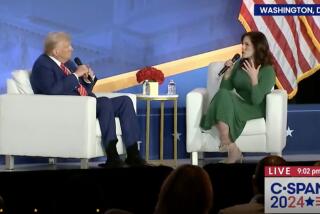Op-Ed: A Harvard poet who came out as trans shows what patient tolerance looks like
âHi everyone!â wrote the poet and Harvard English professor Steph Burt on her Facebook page two weeks ago. âAs many of you know, but some of you donât, after several years of presenting myself as a lady some of the time, and as a guy at other times, I am now a lady all the time.â
When many Americans assume the worst in those with different outlooks, or characterize ignorance as no better than bigotry, Burt took a different approach, displaying a fundamental tolerance for the confused or curious that is a model for us all.
On the matter of what to call her in person, she wrote: âIâll still answer to Stephen ⌠but Steph or Stephanie, in person, are best. ⌠That said, please do not let it ruin your day if you call me by an old name or use the wrong pronoun; itâs not ideal, but it wonât ruin my day. (It *would* ruin some trans peopleâs days, though.)â More generally, she offered: âPlease continue to feel free to ask me anything; if itâs an inappropriate question Iâll let you know â if not, Iâll answer as soon as I can!â
I thought of Burt when I read the extraordinary Washington Post article about Ayaz Virji, the 42-year-old doctor who belongs to the first Muslim family ever to live in Dawson, Minn. (population 1,400). He has given three talks in small towns to explain Islam.
Burt and Virji stand for the optimistic belief that dialogue matters, and that peopleâs minds can change.
Virji is patient with his Christian audiences, as he has to be. After his talks, he takes questions such as âDo Muslims believe in birth control?â and âWhy are terrorist attacks always from Muslims?â
Burt and Virji stand for the optimistic belief that dialogue matters, and that peopleâs minds can change. As minorities, they choose to play the role of cultural ambassador. You have a question? Theyâll take it. And they wonât call you racist or transphobic for asking.
Neither Burt nor Virji thinks that everyone must be so generous with their time. But they nevertheless offer important counter-examples to the left-wing argument that itâs ânot the jobâ of minorities to answer questions.
âIf youâre a white person who wants to be an ally, whoâs dedicated to learning, who wants to be educated, start by looking it up yourself!â Kali Holloway wrote in Salon.
âAll you have to do is be willing to take a moment to type something into Google or visit a trans resource website,â Parker Marie Molloy wrote in Slate. She compared asking a trans person about being trans to interrupting a baseball game to ask the players the rules: âI may not have ever had a professional baseball player sit me down and explain the rules and the history of the game, but Iâve still managed to learn the difference between a âballâ and a âstrike.â How did I accomplish this? By consulting the glut of information readily available on the subject online and in print.â
This sad view of the world, in which itâs better to learn baseball online than by asking another human to teach you, was most famously formulated by the black lesbian poet and critic Audre Lorde, who in a 1980 speech argued against the assumption that âit is the responsibility of the oppressed to teach the oppressors their mistakes.â
According to that assumption, Lorde said, âI am responsible for educating teachers who dismiss my childrenâs culture in school. Black and Third World people are expected to educate white people as to our humanity. Women are expected to educate men. Lesbians and gay men are expected to educate the heterosexual world.â All of this teaching leads to âa constant drain of energy which might be better used in redefining ourselves.â
Lorde was right that the work of answering questions about oneself can be draining. But she was wrong that asking minorities to help along the majority culture is âa tragic repetition of racist patriarchal thought,â as she wrote elsewhere. Rather, asking people to tell their stories is the work of citizenship in a diverse country.
Leave aside the facts that not everyone is comfortable with books or has Internet access. More important, like it or not, talking to other people is simply the best way for members of the majority to gain understanding, and the most effective way for members of the minority to change minds.
For a curious cisgender person, Internet reading wonât teach him as much as a conversation with a trans person. For a Christian curious about Judaism or Islam, a real-life sit-down with a Jew or Muslim is better than Wikipedia, a Dara Horn novel or Aziz Ansariâs âMaster of Noneâ (much as I dig that show). Gay marriage succeeded because a lot of us got to know gay people, not because a lot of us read pamphlets. One learns to play or love baseball from players and fans, not from ESPN.com.
Nobody is required to answer questions at any time; weâre not slaves to our interlocutors. And not all of us can be Steph Burt or Ayaz Virji. But all of us should try to be more like them. When people come to us with questions, we should give them answers, not syllabi.
Mark Oppenheimer, a contributing writer to Opinion, is the host of the podcast Unorthodox.
Follow the Opinion section on Twitter @latimesopinion or Facebook.
More to Read
A cure for the common opinion
Get thought-provoking perspectives with our weekly newsletter.
You may occasionally receive promotional content from the Los Angeles Times.










